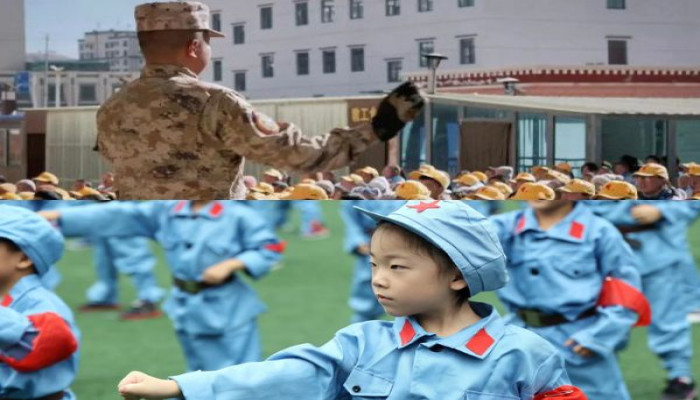China recruits military veterans to Tibetan Schools to indoctrinate children, report says
- In Reports
- 06:05 PM, Sep 15, 2025
- Myind Staff
China has launched a pilot programme that places military veterans in government-run boarding schools to give Tibetan children as young as four military training and political education, according to a Tibet Watch report accessed by News18.
The programme began with 13 veterans assigned to seven schools in Nagchu and marks Beijing’s most direct attempt so far to militarise Tibetan education, targeting children at a very early age in a region already under heavy surveillance, language restrictions, and forced cultural assimilation.
State television has shown Tibetan children in uniforms marching on parade grounds, raising the red flag, and practising safety drills by diving under their desks with notebooks on their heads. Kindergarten children are seen listening to ‘red stories’ that glorify the People’s Liberation Army and emphasise loyalty to Xi Jinping and the Communist Party.
The veterans now serve as instructors in primary and secondary schools as well as kindergartens in Sernye District in Nagchu, an area that has faced tighter control since waves of Tibetan resistance in 2013 and earlier.
The initiative follows the revised National Defence Education Law, which was passed by the Standing Committee of the National People’s Congress and came into effect in September 2024.
In state media reports, troops are shown waking children before dawn in Nagchu’s freezing temperatures to raise the Party flag at Sernye District No. 2 Middle School, described as “the most solemn" ceremony in the school. A boy from the newly established National Flag Guard said the military instructors “are very strict with us".
A Tibetan mother, visibly nervous, appears in the state documentary praising the military instructors and saying her children have become more disciplined and motivated. Pema Tashi, a Tibetan military instructor stationed at Kindergarten No. 5, said that the soldiers’ focus on red education was “taking root in young minds…like seeds sown quietly".
The programme is designed not only to intensify Sinicisation but also to prepare Tibetan youth for military service. Beijing sees Tibetans as valuable to the People’s Liberation Army for mountain warfare along the Indian border because of their adaptation to high altitudes. Recruitment campaigns have expanded, with Tibetan students aged 18 to 21 offered reimbursement of school fees in exchange for joining two years of military training. A government notice stated that students already receiving state aid were required to enrol.
This objective was reinforced in youth military camps held earlier this year, including one training session for 100 students from Lhasa schools. State media described it as “Building Dreams on the Snowy Frontier, Setting Sail for Young Military Spirits". Teenagers in combat uniforms were shown learning how to load guns and march with the red flag. Slogans on the camp walls read “Love the Army and Master the Martial Arts" and “Tibetan compatriots welcome the 18th Army to Tibet". The 18th Army of the People’s Liberation Army entered Tibet in 1950 as part of a wider military campaign, taking Chamdo, the provincial capital of eastern Tibet, on October 7, 1950.
The pilot programme underscores Beijing’s drive to weave national defence and patriotic education into everyday teaching in Tibetan schools at a time when Tibetan-medium education is declining under bilingual policies and China is reinforcing control along borders with India, Nepal, and Bhutan.
According to Chinese and Tibetan-language state media reports in March 2025, the programme implements a 2022 directive issued by the Ministry of Veterans Affairs, Ministry of Education, and Ministry of Human Resources and Social Security.
The directive stated that the programme sought to “thoroughly implement Xi Jinping’s important expositions on education and veterans’ work, further broaden employment channels for veterans, and strengthen the construction of teachers’ teams of primary and secondary schools."
Tibet Watch has earlier reported on military camps for teenagers in Nyingtri near the militarised border with India’s Arunachal Pradesh, and in Nagchu, where students were taught “national defence education knowledge and military doctrine, as well as school rules and regulations".
Xi Jinping has called on border troops to build a “great wall of steel" by boosting frontier defence and control. He has said, “We must adhere to our strategic thinking that to govern the nation, we must first govern our borders, to govern our borders, we must first stabilize Tibet."
Unlike his predecessors, Xi has made several visits to border troops, including a 2021 inspection tour to Nyingtri in the Tibet Autonomous Region, located near Arunachal Pradesh in India. The administrative centre of Nyingtri is Bayi, which means ‘eight one’, a reference to the PLA’s founding on August 1, 1927.
The PLA’s Western Theatre Command, which covers China’s borders with India and Afghanistan, has gained greater priority since the 2020 clashes with India and is now ranked alongside the Eastern Theatre Command in access to new aircraft and weapons.
The veterans in schools programme reflects the call of Tibet Autonomous Region Party chief Wang Junzheng, who has stressed the need to shape children’s thinking to remain loyal to the Party through ideological education and by instilling the values of “love the Party, love the country".







Comments